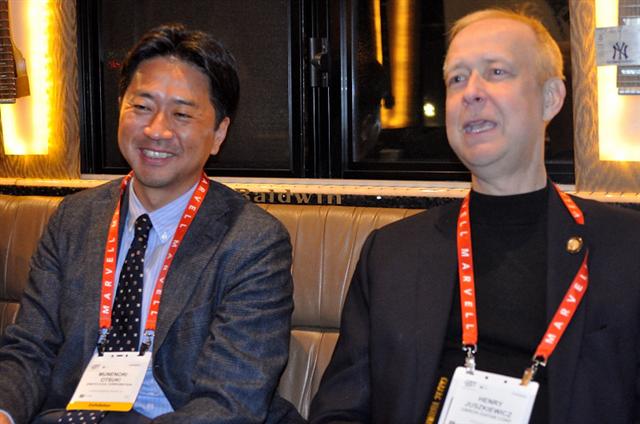Gibson Brands CEO Responds to Moody’s Downgrade
 The music industry is positively buzzing about the announcement late last week by Moody’s Investors Service that, for the second time in three months, it has downgraded the credit rating of Nashville, Tennessee-based Gibson Brands. Gibson (formerly Gibson Guitars) is a tightly held private company that launched an aggressive diversification strategy a few years ago, focusing on acquiring several consumer electronics brands such as Onkyo Corp. and Teac, Corp. and recently Philips.
The music industry is positively buzzing about the announcement late last week by Moody’s Investors Service that, for the second time in three months, it has downgraded the credit rating of Nashville, Tennessee-based Gibson Brands. Gibson (formerly Gibson Guitars) is a tightly held private company that launched an aggressive diversification strategy a few years ago, focusing on acquiring several consumer electronics brands such as Onkyo Corp. and Teac, Corp. and recently Philips.
Now Moody’s suggests the debt used to acquire these brands is dragging the company down…
Moody’s released a statement saying it had “downgraded Gibson Brands (‘Gibson’) CFR [corporate family rating], to Caa1 from B3 due to the company’s weak operating results pushing credit metrics below Moody’s expectations.” A rating of Caa1 is considered below investment grade, or otherwise know as “junk” status. The report from Moody’s was strongly worded, and strongly negative.
The impact of Moody’s actions is to signal to lenders that doing business with Gibson is extremely risky right now. This will cause many institutions to decline lending to them, and will increase the rate Gibson will be forced to pay to induce lenders to carry its debt.
The ‘Rating Outlook is Negative’
The credit agency went on to note that the “rating outlook is negative,” an indication of pessimism for potential future ratings. Further adding, “The negative outlook reflects the risk that Gibson may not be able to meet its near-term financial commitments.”
Gibson, we learned, is facing impending debt payments over the next 22-months or so of about $100 million. Moody’s cited concern about this situation in their analysis as well.
2015 Line Launch is Unsuccessful
Gibson launched a new guitar line in 2015 that was considered fairly controversial. The company chose to include an electronic auto-tuning mechanism in their guitars, for which several market reports suggested there was a high failure rate. In any event, adoption of this new line was very poor, causing a serious decline in company revenues – yet another factor cited by Moody’s as part of their rating.
But the main factor that caused Moody’s to take this action centered around the company’s debt situation. Interestingly, we learn that Gibson’s acquisition strategy had allowed them to experience a dramatic upswing in their revenues – from about $300 million in 2010 to approximately $1.7 billion in 2015.
Debt-Financed Shopping Spree Leaves Company Over-Leveraged
But the pursuit of its debt-financed acquisition strategy has left the company extremely leveraged with a debt-to-EBITDA (earnings before interest, tax, depreciation and amortization) of around 8.5 times – a very concerning level to Moody’s. And while Gibson chose the consumer electronics industry as helping it diversify its reliance on the musical instrument market, Moody’s notes “the risks associated with the consumer electronics business.”
Another interesting comment in the report, and one that is rather unusual in what is usually straight-laced reporting, Moody’s says that another “key concern is that there continues to be high turnover in the company’s senior financial management level.”

‘Like Reading a Prison Memoir’
Gibson is unique in that there has been an extraordinary amount of criticism of company management in general, and of CEO Henry Juszkiewicz specifically, on the blog Gawker, and also on the company rating website Glassdoor. In reporting this story, several music industry websites went so far as to quote from some of the negative Internet comments. One such website, GroovyManStuff.com, in an article titled Gibson Guitars Circles the Drain, noted, “Looking at Gibson’s Glassdoor ratings is like reading a prison memoir.”
“The downgrade reflects the weak performance and the resulting very high leverage and also the additional financial obligations Gibson incurred from its agreement with a consumer electronics supplier to settle overdue payables and the stress it puts on the company’s liquidity profile,” said Moody’s Investor Service senior credit officer Kevin Cassidy.
Gibson CEO Releases Optimistic Statement
Gibson’s CEO Juszkiewicz released a statement that expressed optimism about the company’s prospects. According to Juszkiewicz, the company posted a Q4 in 2015 that was “materially better than they were for the prior year.”
He went on to acknowledge the poor reception to their 2015 line introductions, but added that “we have since introduced our improved 2016 product line that is performing extremely well both in sales to retailers and sell through to consumers globally.” Gibson’s CEO went on to note that they have just brought on board “an outstanding CFO after our former CFO left to start a new business.”
All-in-all, Juszkiewicz says, “We feel we are on an upward trend, poised for an excellent year and are confident of the future.”
A Need to Firm Up Its Foundation
Juszkiewicz also said that the company remains committed to the Nashville area and “we hope to start manufacturing consumer audio products in our Nashville manufacturing campus within the year.”
Still, from the looks of many of the music industry blogs, the company has a long ways to go to repair its damaged reputation. The fact is, Gibson needs their core products – guitars – to continue do well while they work on getting their consumer electronics empire working.

It doesn’t matter how many floors you add to a house to expand its size, if the foundation collapses…it all comes tumbling down.
Learn more about Gibson’s lines at: www.gibson.com.





Leave a Reply